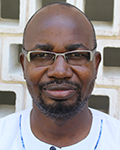2015
Antoni Majémbe Keya
- Lecturer
- University of Dar es Salaam

Abstract
This study is on courtroom interaction between the lay witness and the opposing counsel during the speech event of cross-examination. The objective of the study is to explore the courtroom setting and discourse practices in order to see whether, how, and the extent to which discourse and practices in Tanzanian courts affect the search for justice. The research questions are: 1) How do lay witnesses and opposition counsels exercise control of turns at talk, topic initiation, maintenance, and development during the adversarial speech event of cross-examination? 2) In what way(s) can the courtroom setting and the ritualized formulaic talk (primary reality) affect attempts by the witness to engage in recollection (of secondary reality) and production of evidence sought? The data are collected through observation and audio recording, after which the spoken texts are transcribed and then analysed. The analytical framework for this study is Critical Discourse Analysis, basing on Norman Fairclough's three-dimensional framework—looking at discourse as text (description), discourse as discursive practice (interpretation), and discourse as social practice (explanation).
Abstract
This study interrogates the display of compassion for electorates by both members of parliament (MPs) and ministers during Q&A sessions. MPs present their electorate as being in a predicament, and ministers participate in parliamentary discourse as representatives of the government, theoretically speaking to a bigger electorate, coming in as the patron. The problem to be addressed in this study is how MPs and ministers manipulate linguistic resources to convince their electorates that they are more sensitive to their economic and socio-political wellbeing, and the impact this kind of rhetoric is likely to have on the doing of politics as a social practice. This study will analyze Q&A sessions (video, audio and printed texts), and interview Tanzanians of voting age on their views on politicians’ enactment of compassion for them. A triangulated analysis will focus on logos, pathos and ethos; Social Identity Theory; and the Faircloughian model of discourse analysis.

